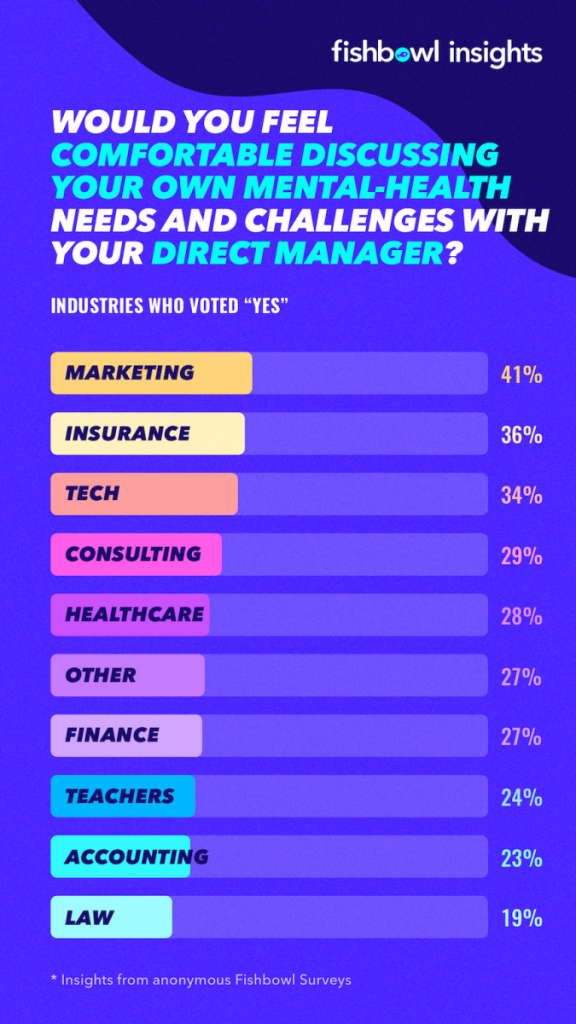A recent survey of nearly 5,200 professionals found that accountants are among the least comfortable having a discussion about their mental health with their supervisors.
Fishbowl, a virtual watercooler of sorts for workers from a variety of industries, asked its users in March to answer “yes” or “no” to the following question: Would you feel comfortable discussing your own mental health needs and challenges with your direct manager?
Public and industry accountants were among the 5,183 professionals who anonymously responded to the question. Based on the results, Fishbowl determined that advertising and marketing professionals (41%) were the most comfortable talking to their managers about their mental health, followed by those who work in the insurance industry (36%) and tech professionals (34%).
Of the nine industries represented in the survey, accounting ranked next-to-last with only 23% of professionals answering “yes” to Fishbowl’s question. The least comfortable industry is law with just 19% of professionals saying they would discuss mental health with their manager.

The grind of working in public accounting—and the detrimental effects it can have on a CPA’s mental wellbeing—are often discussed on online forums like Fishbowl, where accounting professionals have asked their peers how they have dealt with anxiety, depression, and burnout.
In an article published by the Colorado Society of CPAs, Lisa Hackard, an audit partner with KPMG, said it’s critical for accounting firm leaders to really listen to what employees are saying in casual conversation.
“How do they show up to virtual, in-person, or phone meetings, or even through email?” Hackard asks. “Pay attention to what they don’t say. Checking in, asking how people are, and then taking time to really listen and invest in the person is something that continues to be important.”
Hackard said people crave three things: see me, include me, and invest in me.
“Health and wellness hit each one of those. Seeing, including, and investing in people play into the benefits a company offers and helps people interact.”
She also said firms should think of mental health and wellbeing as just another topic that happens to be highly relevant to the entire accounting profession.
“People at all levels increasingly are understanding the importance of mental health and wellbeing to workplace performance,” Hackard said. “I don’t believe our profession will let this slip off the radar screen.”
Overall, 71% of the professionals who responded to the Fishbowl survey said they’d feel uncomfortable talking to their managers about mental health. Men and women feel similarly about mental health conversations at work. Just 30% of women and 27% of men said they’d feel comfortable discussing mental health issues with their boss.
“We hope that this data will serve as a catalyst for employers to create a more supportive work environment that promotes open communication about mental health issues,” Fishbowl said in a press release. “By prioritizing employee well-being and breaking down the stigma surrounding mental health, employers can foster a more productive and engaged workforce.”
Thanks for reading CPA Practice Advisor!
Subscribe Already registered? Log In
Need more information? Read the FAQs
Tags: Benefits, Firm Management, Human Resources




